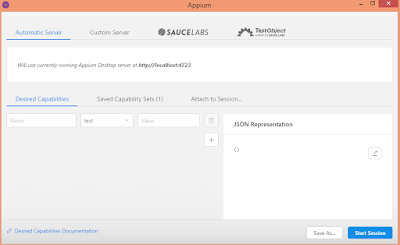Overview :-
If you want to start mobile automation on Android device/emulator, first you must need to setup the Android SDK on your machine and set the paths in environment variables.Then you can create your own emulator and run the test scripts on it.
Pre-requisites :-
1. JDK installation
2. Android SDK installation and Emulator Creation
3. Appium installation
- By node.js (Backend)
- By Appium.exe (Desktop UI)
4. Native App information
- .apk file - This is not required if you specify appPackage and appActivity capabilities
- appPackage - Activity name for the Android activity you want to launch from your package. This often needs to be preceded by a . (e.g., .MainActivity instead of MainActivity)
- appActivity - Java package of the Android app you want to run
Prerequisted Jars:
- java-client.jar - For Appium
- selenium-server-standalone.jar - For webdriver capabilities
- commons-validator.jar - if want to run appium server programatically







